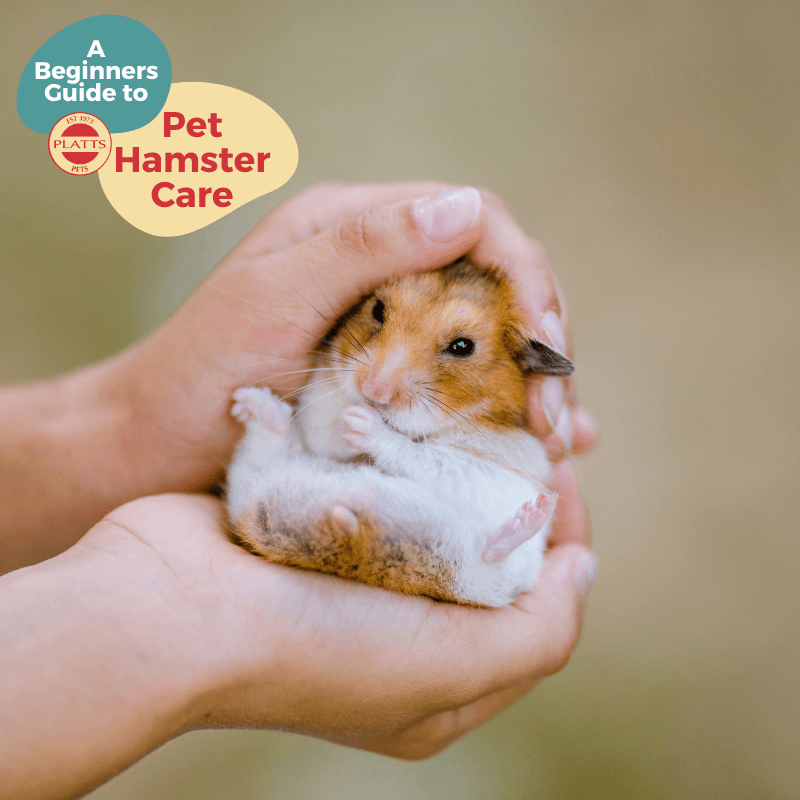

· By Platts Pets
A Beginners Guide to Pet Hamster Care
Whether you're considering adding a hamster to your family or have recently welcomed one into your life, this beginner's guide to pet hamster care is for you!
From understanding their unique behaviours to securing the right bedding for their perfect habitat, caring for a pet hamster requires knowledge and patience.
Keep reading for pet hamster care tips...
Getting started with your hamster
Before adopting a hamster it is important that you do your research. Even though they are small pets, they require the same care and commitment as dogs and cats.
It is important to ensure that you can meet all of their needs, from healthcare to socialisation. Consider the cost of owning a hamster and that you have enough space to allow them to be active.
Also, make sure that you choose a healthy hamster from a reputable breeder or a rescue centre. There are many small animal rescue centres across the UK, including;
North Clwyd Animal Rescue
Aunty Animal
Rescue Me Animal Sanctuary
Setting up the perfect hamster habitat

Your pet hamster will need a comfortable and safe environment to thrive.
Invest in a spacious cage, which should be no smaller than 100cm x 50cm x 50cm for all species of hamsters, as advised by the Blue Cross. The cage must also have proper ventilation and secure latches to prevent escapes.
Setting up a hamster's habitat is much trickier than you might think. Ensure to provide proper bedding, such as our premium woodshavings, and ensure the space has hiding spot and toys for enrichment.
Read our full guide to hamster bedding and cages before your new family member arrives home.
Nutrition and diet
Did you know that hamsters are omnivores? That's right! This means that wild hamsters will eat a mix of plants and insects.
Offer your pet hamster a combination of fresh vegetables and protein-packed treats like mealworms, similar to how they would eat in the wild. Occasionally, you can give your hamsters treats like fruits and seeds.
Make sure to always provide fresh water, preferably in a sipper bottle, to prevent spills and contamination.
Work with your vet to determine your hamster's caloric needs based on their size and health.
Maintaining hygiene and cleanliness
A fun fact about hamsters is that they are tidy creatures!
But whilst they are themselves very clean, there are things owners need to do to keep your pet in good condition.
Hamsters do not require bathing with soap and water, unless instructed to do so by your vet. Some dwarf hamsters do enjoy regular sand baths, using chinchilla sand products.
Cages should be deep cleaned regularly and you should remove soiled bedding an uneaten food daily.
Pay special attention to areas where your pet urinates and ensure they are thoroughly cleaned to prevent ammonia buildup.
Exercise and enrichment

As a new hamster owner, you need to meet a variety of needs, from chewing, climbing, exploring, burrowing, and hiding.
They are highly active creatures and need regular exercise to stay happy and healthy. Provide a wheel for running and toys for mental stimulation.
If you have the space, create a playpen outside of the cage where your hamster can explore under supervision.
Health and wellness
It is important to monitor your hamster's health closely and be on the lookout for any signs of illness or injury.
Annual visits to the vets are essential to record your pet's weight, check for dental issues, and review diet. They can also assist in trimming nails.
Be sure to read the RSPCA's guide to hamster health.
Handling and socialisation
Did you know that hamsters are actually very shy creatures?
However, the more you play and handle your hamster, their confidence will rise. This will mean you'll have a hamster who is happy to be handled.
It is important to note that different breeds of hamsters can have different temperaments. Therefore, they will need different socialisation treatments.
Understanding hamster behaviour

Understanding small animal behaviour is important when it comes to hamster care.
Normal hamster behaviours include being active at night, as they are nocturnal animals, chewing to grind down their teeth, as they constantly grow, stuffing their cheeks, burrowing, and hiding.
A happy hamster will exhibit all of the above behaviours, as well as leaping into the air, signaling high spirits and a good mood!
There are a few behavioural signs to watch out for that are not normal. These include hibernating, a lack of energy, not eating or drinking, and not chewing.
An unhappy hamster might constantly hide during awake or play periods, which may be a sign of anxiety or stress.
If you're ready for the journey of caring for a hamster, secure your hamster's bedding today to ensure you provide the best environment.
